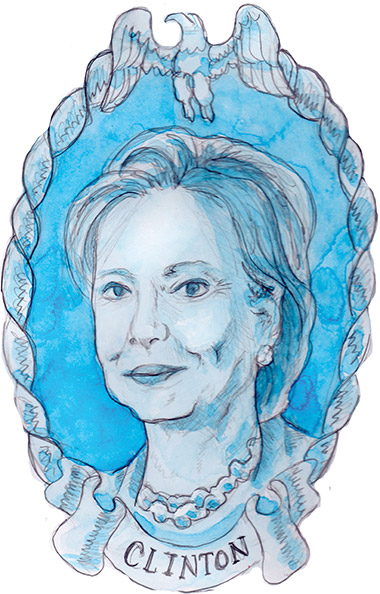Lifelong politician leads in Dem. delegate count
March 23, 2016
Before her campaign was official, Hillary Clinton was the first clear candidate for the 2016 presidential election. Having already run unsuccessfully in 2008, many people viewed her as the one who would carry the torch of the Democratic Party from Barack Obama after his two terms in office.
Clinton has had a lifelong involvement in politics, beginning as a high school student when she campaigned for presidential candidate Barry Goldwater in 1964. Clinton was initially inspired by Goldwater’s book, the Conscience of a Conservative.
Towards the end of the 1960s, her political views changed to become more liberal, thanks to exposure to Civil Rights activists In the early 1970s while studying law at Yale, she met her husband Bill Clinton, who went on to become the governor of Arkansas in the 1980s, and then President of the United States in the 1990s. Of course, when her husband became governor and president, Clinton became first lady, and she took to her responsibilities with great enthusiasm, to the point of drawing criticism from some for being too active in affairs that the first lady would not traditionally be involved in.
After her husband’s presidency, Hillary Clinton was elected as a New York senator of New York and drew notoriety for backing the Iraq War.
When Obama became president in 2009, Clinton joined his cabinet as Secretary of State for one term, a job that went on to define her career. Most notably during this time, Clinton was faced with taking responsibility for the attack on a U.S. diplomatic compound in Benghazi, Libya, which came to be known as the “Benghazi Scandal.”
Clinton has emerged as the likely nominee for the Democratic Party in this election, but she has faced a significant challenge from Vermont senator Bernie Sanders, who has generated a large following with his anti-Wall Street policies and support for issues such as income inequality, social justice and tuition free public universities.
Republican frontrunner Donald Trump has also been a concern for Clinton in a potential matchup in the general election this fall, where polls indicate there would be a very close election.
Charles Jetty, a freshman studying political science at Kansas University (and a recent graduate of Madison East High School), gave an analysis of what makes Hillary Clinton very appealing to some, and very unappealing to others.
“I think Clinton’s appeal largely stems from what voters perceive to be her sense of pragmatism…her combination of experience and prudence has led many to believe that she is the most qualified candidate in the race,” Jetty says. “I feel like she especially has an edge with voters who are less concerned about bringing an ‘outsider’ candidate into the white house, the older voters who are familiar with her name and know she can handle the job.”
Jetty suggests that Clinton’s greatest challenge in the road to the nomination is securing the youth vote, which the campaign has been struggling with it. If she overcomes Sanders and wins the nomination of the Democratic Party, those such as Jetty believe that Clinton appears to be the most likely candidate to win the presidency.
He adds, “I personally don’t relate to her and I don’t think she relates to youth much in general. You can tell she’s tried to fix her relationship with young voters, and it isn’t working… she’s become kind of a joke. Her twitter is full of miscalculated attempts to reach out to us. There was a tweet where she asked her followers to describe their student loan debt using three emojis. That kind of stuff just comes across as superficial and oblivious, especially when you have a guy like Bernie Sanders running against her, who isn’t trying to use memes or puns to get the youth vote. He just has policies and beliefs that are more aligned with the changes that younger voters want to see.”
Here’s where Clinton, as of mid-March, stands on the big issues according to www.isidewith.com:
- Gay Marriage: Supports gay marriage and supreme court ruling.
- Planned Parenthood Funding: Supports funding.
- Abortion: Pro-Choice.
- Global Warming/Climate Change: Accepts global warming as real and supports.
- Unions: Supports labor unions.
- Trans-Pacific Partnership: Believes there are too many hidden provisions in the agreement, but would support it otherwise.
- Immigration: Supports amnesty for illegal immigrants and helping them gain citizenship.
- Healthcare: Backs Affordable Care Act (Obamacare).
- Energy: Supports hydraulic fracking, but also supports alternative energy.
- Tuition: Supports lowering tuition, but does not support free tuition.
- Public Spending: Believes cuts to public spending would hurt the economy.
- Minimum Wage: Supports raising minimum wage to $12/hour.































